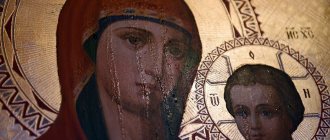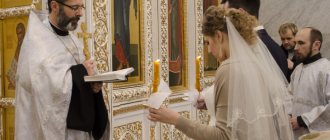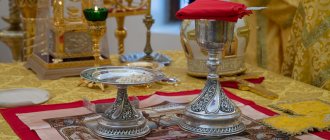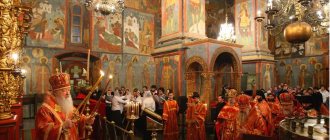A small upper room on Mount Zion is the place where, at a meal with Jesus and his disciples, the words that are now heard daily in the temple were first spoken:
“Take, eat, this is My Body...”
And then - about wine, His “Blood of the New Testament.” This was the first Sacrament of the Eucharist in the history of mankind. It remains the same to this day.
Holy Communion - what is it in simple words
This is the union of the believer with Christ, not only spiritual, but also physical. Through the prayer of the priest, the bread and wine are mysteriously “transformed” into the Body and Blood of Jesus.
This means that they, according to the theologian N.D. Uspensky, have “one nature of bread and wine, which do not cease to be such, and one supernatural nature, which the elements brought into the Holy Eucharist acquire through the action of the Holy Spirit on them.”
How the things of this world, remaining themselves, receive the Divine nature is a mystery inaccessible to the human mind.
What is the essence and meaning of Communion
The essence of the Sacrament itself:
- in the transformation of bread and wine into Body and Blood;
- in the very communion of the faithful with them.
The meaning of what is happening is to overcome the gap that arose between God and man after the Fall. Having fallen away from God of his own free will, a person in the same way, of his own free will and intention, can return to Him.
This opportunity is a great gift, unavailable for thousands of years even to the righteous of the Old Testament, who were not worthy of union with God - what can we say about the pagans? For centuries they tried to “storm the sky” - either by building majestic temples to the gods or by making bloody sacrifices. But human nature, which had fallen away from the source of life, did not give him the opportunity to see the right path to the lost Paradise - until the Virgin was found, who, in Her purity and innocence, was worthy to become the receptacle of the Incarnate God. And, most importantly, she agreed to trust Him:
“Behold, the servant of the Lord, be unto Me according to thy word...”
Thus, the Incarnation of Christ from the Mother of God opened the way for people to God - through union with Him, which is possible at any time through the Sacrament of Communion. But - only by the voluntary consent of a person, his request, that is, prayer. That is why the Spirit does not “spontaneously” descend on bread and wine, transforming them into Body and Blood, but through the prayer of the priest .
Every Christian is also free to deprive himself of the Sacrament or to begin the Cup of Life. The Lord is waiting for everyone to come to Himself.
What does it mean to “take Communion”?
One of the meanings of this word is “involvement,” that is, direct participation. You can be involved in an event, be part of a family or another group. A person can be called “involved” in some business or project. But through the Eucharist he becomes involved in God - literally physically. This is evidenced by one of the prayers of thanksgiving performed by a Christian after the Sacrament.
The person praying asks Jesus Christ:
“...Go into my hearts, into all my parts, into my womb, into my heart. The thorns of all my sins fell. Cleanse your soul, sanctify your thoughts. Confirm the compositions with the bones together...”
Why does a person need Communion?
It is necessary:
- the soul - then why the body needs food; this is spiritual “nutrition”, union with God, without which spiritual “starvation” will certainly occur: the world with its vanity will so enslave the soul that the road to Paradise will be completely closed to it;
This is how the saint writes about it. Paisiy Svyatogorets:
“When a person stops praying, he moves away from God and becomes like an ox: he works, eats, sleeps. And the more he moves away from God, the worse it becomes. The heart becomes cold, and then he can no longer pray at all...”
To prevent this from happening, it is necessary to unite with Christ.
- the body - it is subject to passions, the fight against which is impossible with human strength; It also happens that the Lord, through the main Sacrament, even deigns to heal the most terrible diseases, if such healing is useful to the sufferer and leads him to faith.
A well-known incident occurred in 1991 in the church of St. John’s Convent in St. Petersburg. It is described by journalist Dmitry Orekhov, author of the book “Holy Places of Russia”.
To the relics of rights. John of Kronstadt, the servant of God Valentina, who was sick with oncology, once came here - she had already been discharged from the hospital with the sentence “to go home and die.” They say that when she first entered the temple (even though she had lived nearby all her life, it was a quarter of an hour’s walk), she didn’t even know how to cross herself correctly. After listening to the patient, the priest blessed her to confess and receive communion daily. The patient began to come to the Sacrament every day - which could have been her last. It took her at least an hour to get to the monastery, she felt so bad. But what hurt worse than her body was her soul, burdened with sins... Therefore, the woman did not immediately notice that she was gradually reaching her already beloved temple faster and faster - now half an hour, now 15 minutes... Only a month later, during an examination, the stunned doctors stated: she is healthy!
What does Holy Communion give to a person?
Those who regularly approach the Sacrament say that it is:
- spiritual peace that Christ promised to His disciples: “My peace I leave with you, my peace I give to you...” (John 14:27);
- strengthening in the fight against sin and passions;
- unspeakable joy.
First Communion of the Apostles
It took place at the Last Supper, when the Lord blessed the bread and wine - according to the Jewish tradition of the Passover meal. But in a different way than the Jews did: He gave them as His Body and Blood. It is no coincidence that the traditional Jewish Passover lamb was not present at that meal - for, according to the word of St. Paul, “Our Passover, Christ, was sacrificed for us” (1 Cor. 5:7)
Last Supper
The same, the first Communion, showed the consequences of unworthy Communion: the unrepentant Judas, who had already decided to betray the Teacher, not only did not receive the gifts of grace, but, according to the Apostle, “Satan entered into him.” He not only betrayed Christ. Even after repenting, he gave in to despair, reaching the point of suicide. And now, as the fathers say, similar things happen - even before illness, death, with unworthy people who approach without reverence or repentance.
The Power of Purification Rituals
The ritual of reprimanding a person with prayers has been known since pagan times. In this way, people tried to get rid of the negative influence of dark magic.
During the ritual, the damage is removed from the victim and transferred to a specific object or neutralized. In some cases, the magic is returned to the person who cast it, if that person's name is known.
Church customs
In the church, the ritual with prayers is carried out only on pre-designated days. All people who want to remove the negative impact from themselves gather in the room, the priest reads sacred texts to cleanse those affected from negativity.
A reprimand in the Orthodox Church helps only those who sincerely believe in God and are ready to repent of their sins. But the ritual has one drawback - with a large crowd of people, damage can pass from one person to another.
Indications
The cleansing ritual only helps when the negativity has been brought about with the help of magic. The presence of magic is indicated by the following signs:
- the appearance of pigment spots in the absence of diseases;
- weight loss or sudden gain;
- disruption of the menstrual cycle;
- problems with conception;
- difficulties in relationships;
- depression;
- deterioration in health while in the temple.
Before starting the ritual of reprimand, you should make sure that there is a magical effect. To do this, the victim must place a glass of water on his head, holding it with his hands. Then a chicken egg is broken into it and observed.
If the water becomes cloudy, it means there is a negative impact on the person; if the liquid remains clean, there is no damage.
Dates
Sometimes it takes more than one ritual to remove all the negativity. Their number is influenced by the characteristics of the situation, the strength and duration of the damage. On average, 3-4 rituals are required.
How does the Sacrament of Communion take place in the Orthodox Church today?
The rules for preparing for the Sacrament are set out in the document “On the Participation of the Faithful in the Eucharist” adopted by the Bishops’ Conference on February 2-3, 2015.
For a summary of the document, read the article:
- On the participation of the faithful in the Eucharist
When can I take communion?
During the liturgy , in the morning. In large city churches it is served daily. There are also churches with small parishes, most often rural ones, where the liturgy is held only on Sundays. It is better to find out the time of its completion in person.
Divine Liturgy. Priest with the Holy Gifts
How to prepare and what time to arrive
Communion occurs towards the end of the liturgy, and its duration is usually about one and a half hours. However, it is not customary for Christians to come directly to Communion: the liturgy itself is a contact with the Last Supper of the Savior, a remembrance of it. That is why Christians, especially those who are going to receive communion, come to the very beginning of the service, trying not to be late, and pray especially reverently during it - for the sake of the upcoming Sacrament.
Fasting, prayer, confession
These are the three components of preparation for Communion.
Lenten work
Abstinence of the body is a necessary condition for preparing the soul for the Sacrament. Required:
- the so-called “preparatory fast”, or preparatory;
- The Eucharistic itself is just before the reception of the Holy Mysteries.
Preparatory fasting is abstinence from animal foods (meat, dairy, many also try not to eat fish). Spouses are also recommended to abstain from intimacy for a certain time. Finally, it is necessary to exclude entertainment and, if possible, attend religious services.
The duration of fasting is usually three days (if a believer approaches the Holy Mysteries often, for example, every 1-2 weeks, it can even be 1-2 days). Sometimes, if a person has not received communion for a long time or has serious sins, the preparation may last longer - in agreement with the priest.
Eucharistic fasting is a complete renunciation of food and drink from midnight until the Sacrament itself. The Church insists that those who are addicted to smoking should also abstain from tobacco. There are churches and monasteries where the liturgy (for example, the Presanctified Gifts) is served in the evening. Then the fast lasts at least 6 hours.
Prayers
It is usually customary to read the canons of repentance:
- Christ;
- Holy Mother of God;
- to your Guardian Angel.
The canons can be read one after another, or combined together. Sometimes pastors recommend that beginners, who are not accustomed to lengthy prayers, simply read one canon a day during the entire preparation for Communion. And some Orthodox Christians also zealously read the Akathist to the Sweetest Jesus.
Repentance
Finally, Communion is preceded by another Sacrament - confession . It is necessary, because, according to St. Simeon the New Theologian, “just as it is impossible for fire and water to be together in the same vessel, so it is impossible for both the most pure Body of Christ and the abomination of sin to be together in the same Christian .
It is better to find out in advance about when Confession takes place in a particular church. As a rule, it is performed during the evening service, based on the desirability of the presence of the communicant at the service on the eve of the Sacrament. If for a good reason (being busy at work, at home with small children, health conditions) a believer was unable to attend the service in the evening, he can also confess in the morning. However, this must be agreed upon with the priest, preferably in advance.
Follow up
These prayers are performed in the morning, usually before leaving the house. The sequence consists of:
- short prayers that have a very ancient origin, from the first centuries of the Church; in everyday life they are also called the “ordinary beginning”;
- several psalms, including the penitential 50th (Have mercy on me, O God...);
- The Canon, the refrains of which are taken from this Psalm;
- prayers composed by St. John Chrysostom, Basil the Great, Simeon the New Theologian, and other saints.
Preparation for communion consists of physical, spiritual and prayerful preparation:
A brief scheme of preparation: fasting for three to seven days - the night before, attending a service in a church - a house of prayer - in the morning for confession - and at the end of the service, receiving communion.
Fast from 3 to 7 days (judge by your condition: someone can only do three days, and someone can do all seven). Usually those who rarely receive communion and skip fasts fast for 7 days. Those who take communion regularly fast for 3 days. Fasting means physical and spiritual fasting. This means: do not eat food of animal origin, do not participate in drinking and celebrations, spend your days more calmly, without fuss, take water more often, do not have relationships with your husband or wife, do not smoke, think more about sins and God. At the moment of communion, be in feminine purity.
How to approach the Holy Chalice and other rules
When the Holy Gifts out of the altar,
“Come on with the fear of God and faith!”
At the same time, everyone bows to the ground. It is replaced by a waist bow when it is not customary to bow to the ground during divine services - for example, these are the days of Bright Week after Easter.
Then everyone who has the blessing proceeds to the Chalice. Usually:
- Children are the first to receive communion, as well as the weak and sick;
- then - men, however, in many parish churches this is not strictly observed;
- after them - women.
When approaching Communion, a Christian:
- folds his arms on his chest in a cross, the right hand should be on top;
- does not cross himself in front of the Chalice, so as not to accidentally touch it;
- clearly states his name given at Baptism;
- accepts the Holy Gifts into the mouth;
- after that he kisses the Cup.
How often should you take communion?
Until 1917, there was a practice of starting the main Sacrament only once a year. Some also received communion in all four fasts of the church year.
Modern pastors most often advise doing this at least every month. Some try to receive communion more often, while others begin the Sacrament once every few months, but regularly.
The frequency of communion is usually determined by the spiritual state of a person, his desire, and, of course, it is worth consulting with a confessor or simply a priest of the temple.
What to do after Communion
At the end of Communion, you do not need to leave immediately, you must wait until the end of the liturgy and venerate the cross. Then, most often, prayers of gratitude are read, which everyone who has been honored with Communion remains to listen to. If for some reason the prayers are not read publicly, you can thank the Lord yourself, in church or at home, depending on the circumstances. Prayers of thanksgiving are in prayer books; they usually appear after the Follow-up to Communion.
Getting rid of damage through 3 and 7 churches
With the help of church rituals, you can heal your soul from negative slander of any complexity. But the stronger the witchcraft, the more complex the ritual that gets rid of it. To get rid of weak or mediocre damage, the ritual of passing through 3 churches will help, which is carried out as follows:
- You need to attend different churches for 3 Sundays in a row. An important condition is that none of these Sundays should fall on any Christian holiday;
- In all these churches, one should offer a prayer to the Guardian Angel, begging him for help and protection, and then light candles for the health of all people one knows;
- Before leaving the temple, you must read any of the prayers that relieve damage;
- Upon returning home, 3 church candles are lit. You cannot tell anyone about the ceremony.
In turn, the rite of purification through 7 churches will save you from strong and destructive witchcraft. It is carried out this way:
- A day before the start of the ceremony, light a candle near the face of the saint who patronizes you;
- At dawn the next day, set out on an impromptu pilgrimage to seven churches. The tour of the temples must be completed before sunset;
- Order a magpie in each of the churches you visit, light a candle for the health of the victim of damage and his family members (if you want to remove the family curse);
- Collect holy water from all churches you visit. Drink this life-giving moisture and wash your face with it over the next week;
- At the end of the ritual, return home. Without telling anyone about your pilgrimage, pray to the Guardian Angel.
Remember that it is impossible to recover from damage in an instant. Negative slander is tantamount to illness, only it is mental illness. Just as the condition of a recovering patient gradually improves, you will feel better over time. But under no circumstances should you rush things and get angry at the lack of immediate results when removing damage from a church. You risk incurring the wrath of the Lord, and this is much worse than any, even the most powerful, witchcraft slander.
Share with your friends!
Read us in the Zen channel










